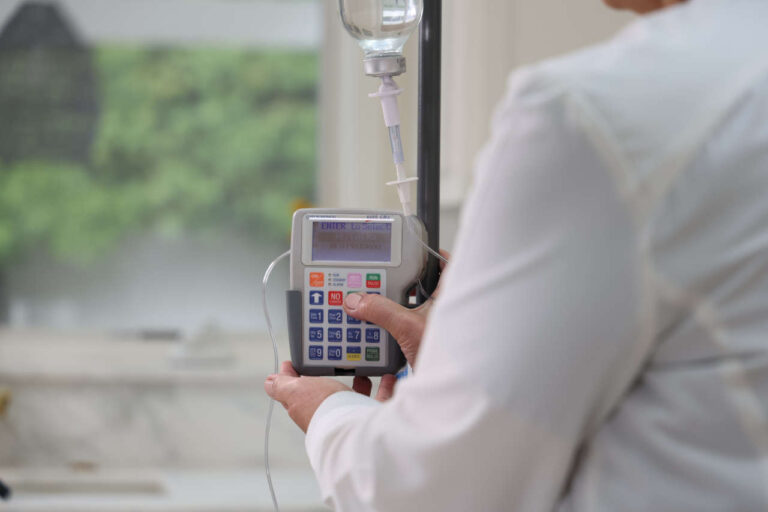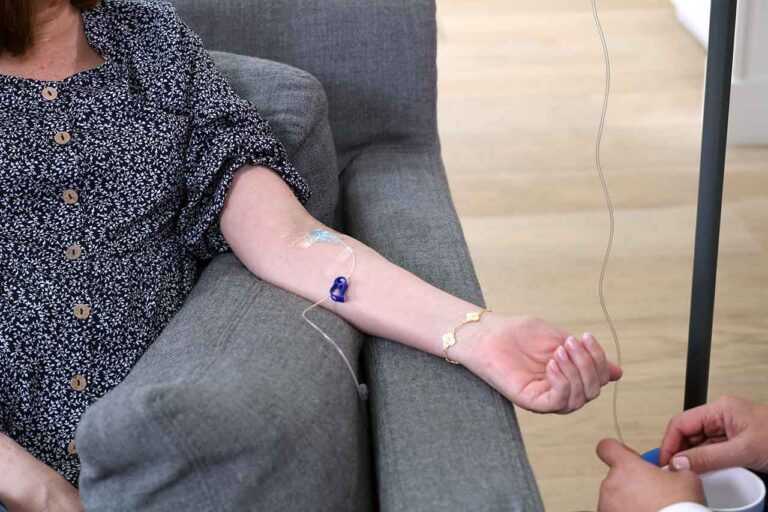
The use of IVIG for infertility and in vitro fertilization (IVF) failure is common in the U.S., unlike in other developed nations. So, what makes IVIG so attractive?
This article explains when IVIG may be an option for infertility. You will also learn about IVIG success rates, potential side effects, and treatment cost.
Get IVIG Copay Assistance
Speak to a SpecialistA Quick Overview of Unexplained Infertility
Unexplained infertility is when you have repeated miscarriages or IVF failures. It may also be called recurrent pregnancy loss. The “American College of Obstetricians and Gynecologists” defines recurrent pregnancy loss as having two or more miscarriages [1].
In the US, nearly 13 in 100 women of childbearing age seek treatment for infertility annually [2].
Many factors can cause unexplained infertility. These include:
- Abnormal uterus
- Thyroid disease
- Diabetes
- Abnormalities in the mother’s immune system
- Unusual blood clotting in the mother
IVIG for Infertility: When It May Be an Option
IVIG may be an option if miscarriage is due to the body’s abnormal immune response to the embryo.
In a normal pregnancy, your immune system accepts the embryo (even though it is 50% foreign tissue).
But, when your immune system fails to accept the embryo, miscarriages can occur. When this happens, your body will produce more white blood cells (specifically natural killer cells) that attack the embryo.
How IVIG works for infertility is not fully understood. Nonetheless, it is thought to reduce the risk of rejection by [3]:
- Neutralizing the antibodies that attack the embryo
- Reducing the number of natural killer cells
- Restoring the balance of specific immune cells involved in immune regulation
IVIG for Infertility: What Is the Success Rate?
According to an extensive review, IVIG treatment was associated with a two-fold increase in live birth rate in women with repeated miscarriages and underlying immune diseases [4].
In women with repeated implantation failure, IVIG may improve the implantation and pregnancy rate [5].
A 2017 Cochrane review found higher pregnancy rates in IVIG-treated individuals (52%) than in untreated individuals (27%) [6].
The success rate depends on a woman’s underlying immune disorder and the timing of the IVIG infusion and ovulation. For instance, it might be best to administer IVIG infusion before conception in women with increased natural killer cells [7].
The Limitations of IVIG for Infertility
Despite promising results in numerous studies, IVIG is still an experimental therapy for infertility. Many professional organizations recommend against using IVIG for infertility.
For instance, the Practice Committee of the American Society for Reproductive Medicine (2018) states that there is insufficient evidence to recommend IVIG for improving IVF outcomes.
Likewise, a 2021 update by the American Academy of Pediatrics does not recommend IVIG for recurrent pregnancy loss and seeks further investigations [8].
Interestingly, the Korean Society for Reproductive Immunology recommends IVIG for women with recurrent pregnancy loss/repeated implantation failure who also have underlying immune disorders [3].
Can IVIG help?
Free IVIG Treatment InfoSide Effects and Cost of IVIG for Pregnancy
Severe side effects are infrequent and typically include infusion-related reactions. IVIG can also affect certain lab results.
Common complaints can include:
- Headache
- Fever
- Rash
They are usually mild and manageable with IVIG premedication and slow infusion rates.
IVIG therapy is expensive. A single course of therapy can cost $7,000 to $14,000 [9].
Key Takeaways
- IVIG is a promising yet unproven treatment for infertility.
- Many experts consider it experimental and not medically necessary.
- IVIG might benefit a subgroup of women with specific immune disorders.
- More research is needed to fully understand its mechanism, optimal doses, and long-term effects.
REFERENCES:
- “Repeated Miscarriages.” ACOG, www.acog.org/womens-health/faqs/repeated-miscarriages#.
- Carson, Sandra Ann, and Amanda N Kallen. “Diagnosis and Management of Infertility: A Review.” JAMA vol. 326,1 (2021): 65-76. doi:10.1001/jama.2021.4788
- Sung, Nayoung et al. “Intravenous immunoglobulin G in women with reproductive failure: The Korean Society for Reproductive Immunology practice guidelines.” Clinical and experimental reproductive medicine vol. 44,1 (2017): 1-7. doi:10.5653/cerm.2017.44.1.1
- Habets, D.H.J., Pelzner, K., Wieten, L. et al. Intravenous immunoglobulins improve live birth rate among women with underlying immune conditions and recurrent pregnancy loss: a systematic review and meta-analysis. Allergy Asthma Clin Immunol 18, 23 (2022). https://doi.org/10.1186/s13223-022-00660-8
- Majid Ahmadi, Samaneh Abdolmohammadi-Vahid, Mahnaz Ghaebi, Leili Aghebati-Maleki, Sanam Dolati, Laya Farzadi, Aliyeh Ghasemzadeh, Kobra Hamdi, Vahid Younesi, Mohammad Nouri & Mehdi Yousefi (2017) Regulatory T cells improve pregnancy rate in RIF patients after additional IVIG treatment, Systems Biology in Reproductive Medicine, 63:6, 350-359, DOI: 10.1080/19396368.2017.1390007
- Ghaebi M, Abdolmohammadi‐Vahid S, Ahmadi M, Nikmaram A, Farzadi L, Ghasemzadeh A, Hamdi K, Nouri M, Yousefi M International journal of reproductive biomedicine, 2017, 15(4), 77 | added to CENTRAL: 31 October 2017 | 2017 Issue 10
- Xiuhua Yang, Tao Meng, “Is there a Role of Intravenous Immunoglobulin in Immunologic Recurrent Pregnancy Loss?”, Journal of Immunology Research, vol. 2020, Article ID 6672865, 14 pages, 2020. https://doi.org/10.1155/2020/6672865
- D’Mello, Rahul J., et al. “Update on the Use of Intravenous Immunoglobulin in Pregnancy.” Neoreviews, vol. 22, no. 1, American Academy of Pediatrics, Jan. 2021, pp. e7–24. https://doi.org/10.1542/neo.22-1-e7.
- Intravenous immunoglobulin (IVIG) and recurrent spontaneous pregnancy loss. The Practice Committee of the American Society for Reproductive Medicine. American Society for Reproductive Medicine, Birmingham, Alabama. https://www.fertstert.org/article/S0015-0282(06)03297-3/pdf
- “Recurrent Pregnancy Loss – Medical Clinical Policy Bulletins | Aetna.” Aetna, www.aetna.com/cpb/medical/data/300_399/0348.html.













